Unit 1What would you do?教案(鲁教版九年级) (8)
- 格式:doc
- 大小:33.50 KB
- 文档页数:2
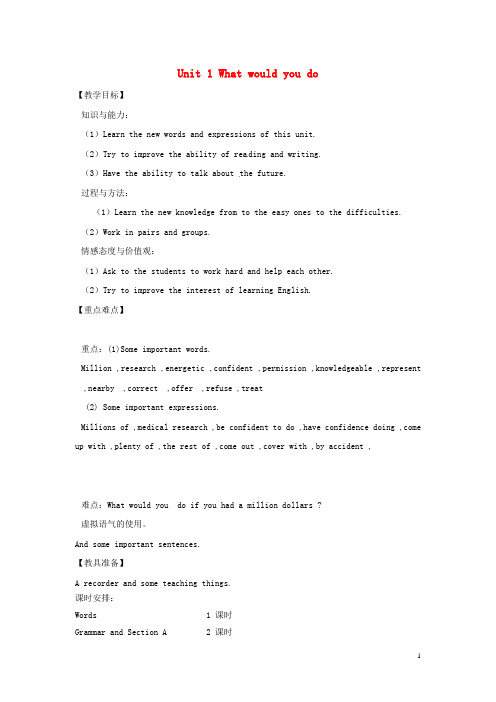
Unit 1 What would you do【教学目标】知识与能力:(1)Learn the new words and expressions of this unit.(2)Try to improve the ability of rea ding and writing.(3)Have the ability to talk about the future.过程与方法:(1)Learn the new knowledge from to the easy ones to the difficulties. (2)Work in pairs and groups.情感态度与价值观:(1)Ask to the students to work hard and help each other.(2)Try to improve the interest of learning English.【重点难点】重点:(1)Some important words.Million ,research ,energetic ,confident ,permission ,knowledgeable ,represent ,nearby ,correct ,offer ,refuse ,treat(2) Some important expressions.Millions of ,medical research ,be confident to do ,have confidence doing ,come up with ,plenty of ,the rest of ,come out ,cover with ,by accident ,难点:What would you do if you had a million dollars ?虚拟语气的使用。
And some important sentences.【教具准备】A recorder and some teaching things.课时安排:Words 1 课时Grammar and Section A 2 课时Section B and Selfcheck 1 课时Reading 2 课时Exercises and Test 2 课时【课题】Unit One What would you do ?【教学目标】知识与能力:(1) Some important words and useful expressi ons(2)learn the new grammar(3)Use them to do exercises过程与方法:(1)采用任务型教学法,用What would you do if you had a million dollars?这个问句,引出谈论假想情况的话题。

九年级英语Unit 1 What would you do? 鲁教版【本讲教育信息】一、教学内容:Unit 1 What would you do?(一)重点单词(二)重点短语(三)重点句型(四)中考真题二、知识总结与归纳(一)重点单词1. million2. medical3. worry4. permission5. knowledgeable6. rest8. correct9. burn10. hurt11. offer12. refuse13. helpful(二)重点短语1. what if2. not… in the slightest3. plenty of4. get along with5. let…down6. e up with7. e out8. rather than…9. hide… from(三)重点句型1. What would you do if you had a million dollars?If sb. did / were + 其他,sb. would/ should / could/ might +动词原形e.g. 1)If I were you, I would buy it.2) If he had time, he would go to the concert with you.2. This old man had a million dollars, and he gave it to charity.3. What ifeveryone elsebrings a present?e.g 1) What if we move the desk here?2) What if he doesn’t stay there?3) Do you have anything else to say?4) What else did you see?5) Please take away these dirty clothes and bring some clean ones.6) Please take an umbrella with you.4. Then I’m too tired to do well.e.g 1) He is too young to join the army.2) He was too excited to say a word.3) She ran too slowly to catch him.5. … dogs can be a lot of trouble.in troublee.g 1) She is in hopeless trouble.2) The boy is in trouble again, he has broken a window.6. Confident people aren’t afraid to speak in public.e.g 1) He came into the classroom with a confident smile.2) We are confident of success.confidence n. 信任、信心e.g. 1) I have little confidence of him.2) The girl answered the question with confidence.in public 公开的,当众e.g. 1) Have you ever spat in public?2) He is not used to speaking in public.7. I’d invited him/ her to have dinner at my house.e.g. 1) Thank you for inviting me.2) I invite her to have coffee.3) Why didn’t you invite him in?8. Social situations don’t bother you in the slightest.e.g. 1) I’m sorry to have bothered you.2) I often bothered him with questions.3) You don’t bother me in the slightest.4) —Do you mind if I open the window?—Not in the slightest. Please do.9. You have plenty of friends.e.g. 1) There are plenty of people out of work.2) We have plenty of time to do the work.10. Your friends would probably say that you are easy to get along with.e.g. 1) She is easy to get along with.2) He is getting on (along) well with his classmates.3) How are you getting on (along) with your work?4) How are you getting along with your Chinese study, Jack?11. You like talking to one or two people rather than to a group.e.g. 1) They ran rather walk to school.2) Mary, rather than her classmates, is going to Shanghai.3) He is a student rather than a teacher.4) They lost books rather than money.5) I prefer to go in spring rather than in autumn.12. You would also rather stay at home and read a good book than go to a party.e.g. 1) I’d rather just lie on the beach.2) I would rather walk there than take a bus.3) I would rather go out for a walk than watch TV at home.13. I can’t think of any good advice to give her, but you always e up with good solutions to people’s problems.e.g. 1) At last, he came up with a good idea.2) She can e up with an idea when we don’t know what to do.3) They came up with the climbers at the top of the mountain.(四)中考真题同步要点1. 表示与现在事实相反的虚拟语气,谓语动词的表现形式是:主句用would / should / could / might + 动词原形,从句用动词的过去式(be的过去式一般用were)。
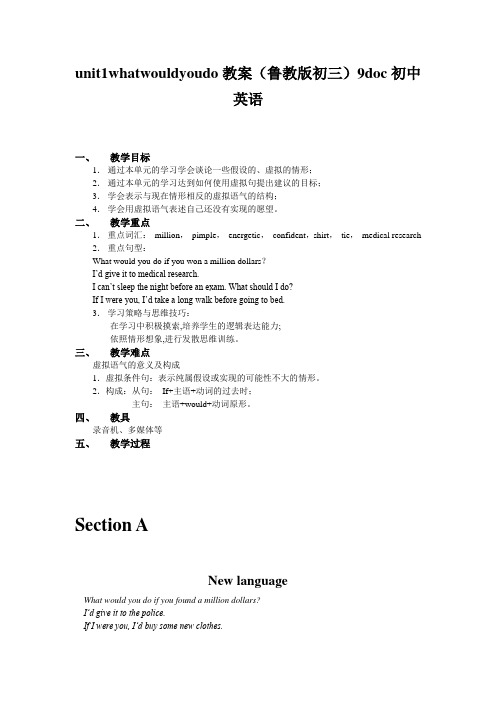
unit1whatwouldyoudo教案(鲁教版初三)9doc初中英语一、教学目标1.通过本单元的学习学会谈论一些假设的、虚拟的情形;2.通过本单元的学习达到如何使用虚拟句提出建议的目标;3.学会表示与现在情形相反的虚拟语气的结构;4.学会用虚拟语气表述自己还没有实现的愿望。
二、教学重点1.重点词汇:million,pimple,energetic,confident,shirt,tie,medical research 2.重点句型:What would you do if you won a million dollars?I’d give it to medical research.I can’t sleep the night before an exam. What should I do?If I were you, I’d take a long walk before going to bed.3.学习策略与思维技巧:在学习中积极摸索,培养学生的逻辑表达能力;依照情形想象,进行发散思维训练。
三、教学难点虚拟语气的意义及构成1.虚拟条件句:表示纯属假设或实现的可能性不大的情形。
2.构成:从句:If+主语+动词的过去时;主句:主语+would+动词原形。
四、教具录音机、多媒体等五、教学过程Section ANew languageWhat would you do if you found a million dollars?I’d give it to the police.If I were you, I’d buy some new clothes.If you don’t know anyone, you can talk t o Tom.Charity, medical research, nervous, pimple, present (n.), millionStep 1 RevisionRevise the Passive V oice of Unit 3: should be allowed to do sth. Then say:〝Students should be allowed to choose their own clothes. If you were a parent, what would you do?〞Let the students talk about it in groups.Step 2 PresentationLet the students think about what they would do if they had a million dollars. Talk about it and write more ideas to the list and share their answers with other students.Step 3 Listening practiceSB 1b Listen and number the pictures [1-3] in the order you hear them. The answers are: 2 1 4 3Step 4 PracticeSB 1c Read the instructions to the class and ask two students to read it to the class. Then say, : Pretend you are the people in the picture. Talk with your partner about other ways you could spend a million dollars. Finally ask several pairs of students to share their conversations with the class.Step 5 ListeningSB 2a First look at the picture and ask the students to tell what is happening. Explain that the boy is getting ready to go somewhere and he is feeling a little nervous. His sister is helping him pick out what to wear.Next read the instructions and point to the list of possible reasons. Ask different students to do it.Say, Listen to the boy and girl talking to each other. Then circle the reasons he is nervous. Play the recording and check the answers: 2 3 5SB 2b Listen again and check the four things Larry’s sister says to him. Check the answers; 1 2 4 5Step 6 PairworkSB 2c Read the instructions and ask the students to work in pairs.Ask students to say their conversations to the class.Step 7 SummarizeReview and summarize the grammar focus. Ask students to read and know how to use the sentences.Step 8 ExerciseSB 3a Match each problem with the correct advice. The answers are 1. c 2 a 3 b.3b Think of different advice for the problems in activity 3a. Then ask several pairs of studentsto say their conversations to the class.4 Read the instructions to the class: What problems do you have at home? At school? Make a list. Then ask your classmates for advice. Help the students form groups of four or five. Each group writes five questions starting with the words What problems do you have at home/ at school? Move around the room checking the work of each group.Step 9 HomeworkWrite a passage about the problems at home or at school, then give advice.Section BNew languageOutgoing, creative, right awayStep 1 revisionRevise the important sentence structure in Section A and check the homework.Step 2 PresentationSB Page 29 1a. Read the instructions to the class. Then fill in the blanks in the sentences below with the words from the box. The answers are: 1. confident 2. outgoing 3. creative 4. shy 5.energeticStep 3 Oral practiceSB Page 29 1b Read the instructions: Which words in activity 1a describe you? Tell your partner. Practice in pairs, then ask several pairs of students to say their conversations to the class.Step 4 ListeningSB Page 29 2a Read the instructions and point to the four questions. Celia is asking Bill questions from a personality survey. Listen and check the questions Celia asks. Play it twice and check the answers.2b Listen again and circle Bill’s responses. Both answers should be b.Step 5 PracticeLet the students ask and answer the questions in the personality survey.A: What would you do if someone asked you to e in a movie?B: I’d say yes.Then pair practice and check the conversations.Step 6 ExerciseSB Page 30 3a This activity provides reading practice using the target language. First ask the students to read the three paragraphs to themselves. Then fill in the blanks in the results with 〝a〞, 〝b〞or 〝c〞. Finally check the answers. 1. c 2 a 3 bSB Page 30 3b Look at activity 2a and write your own personality survey. Then share their ideas with the other students.Step 7 SummarizeSummarize the important phrases and sentences in this section.Step 8 HomeworkFinish the exercises in the workbook and self check.板书设计get along with (sb.)let sb. down=fail to help sb.come up with=find or produce the answerWhat would you do if you did…?I’d do …If I were you, I’d do …教学反思本教学设计适应新教材课程改革要求,最大程度地做到了教师指导下的学生积极参与,使学生有充分的活动和表达自由,在学习过程中不断地锤炼自己、完善自己,培养学生的制造性思维能力。
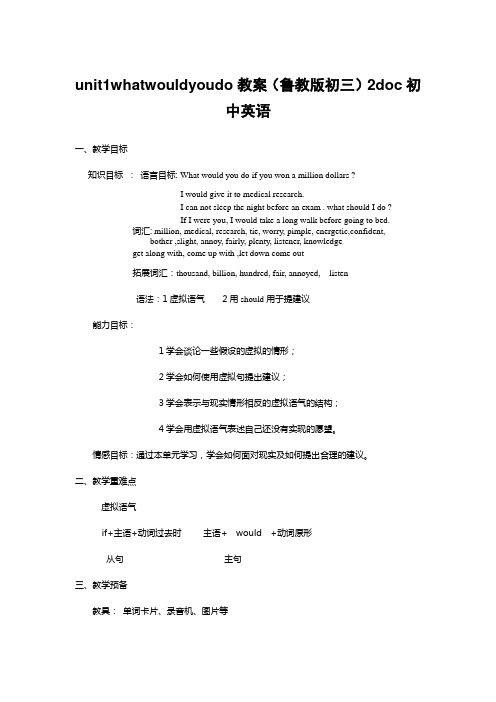
unit1whatwouldyoudo教案(鲁教版初三)2doc初中英语一、教学目标知识目标:语言目标: What would you do if you won a million dollars ?I would give it to medical research.I can not sleep the night before an exam . what should I do ?If I were you, I would take a long walk before going to bed.词汇: million, medical, research, tie, worry, pimple, energetic,confident,bother ,slight, annoy, fairly, plenty, listener, knowledgeget along with, come up with ,let down come out拓展词汇:thousand, billion, hundred, fair, annoyed, listen语法:1虚拟语气2用should用于提建议能力目标:1学会谈论一些假设的虚拟的情形;2学会如何使用虚拟句提出建议;3学会表示与现实情形相反的虚拟语气的结构;4学会用虚拟语气表述自己还没有实现的愿望。
情感目标:通过本单元学习,学会如何面对现实及如何提出合理的建议。
二、教学重难点虚拟语气if+主语+动词过去时主语+ would +动词原形从句主句三、教学预备教具:单词卡片、录音机、图片等四、教学方法以任务型教学模式为主,辅以学生预习-----自学-----自查,情形教学,学与练相结合,单词循环经历等多种方法。
五、课时安排共4课时:1 词汇突破与语法聚焦:让学生识记生词,并拓展部分词汇,通过练习进行检测;让学生把握虚拟语气的结构几现在与今后情形相反的用法。
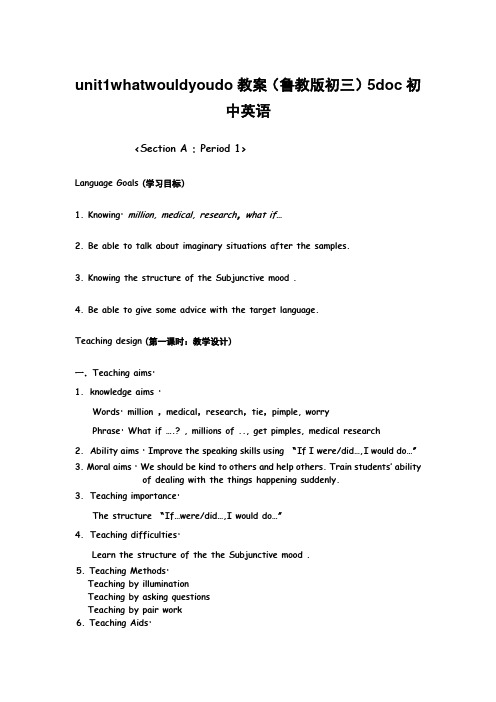
unit1whatwouldyoudo教案(鲁教版初三)5doc初中英语<Section A : Period 1>Language Goals (学习目标)1. Knowing: million, medical, research,what if…2. Be able to talk about imaginary situations after the samples.3. Knowing the structure of the Subjunctive mood .4. Be able to give some advice with the target language.Teaching design (第一课时:教学设计)一.Teaching aims:1.knowledge aims :Words: million ,medical,research,tie,pimple, worryPhrase: What if ….? , millions of .., get pimples, medical research2.Ability aims : Improve the speaking skills using 〝If I were/did…,I would do…〞3. Moral aims : We should be kind to others and help others.Train students’ abilityof dealing with the things happening suddenly.3.Teaching importance:The structure 〝If…were/did…,I would do…〞4.Teaching difficulties:Learn the structure of the the Subjunctive mood .5.Teaching Methods:Teaching by illuminationTeaching by asking questionsTeaching by pair work6. Teaching Aids:A tape recorder; a computer二.Teaching procedure:Step1: GreetingStep2: Learning the new words.Step3: Warm-upShow a picture of a lion with a man in cage. Ask 〝Has anyone been in a lion’s cage?, and tell the students 〝Today we’re going to learn about how to talk about things like that that haven’t happened to us.〞Point to the picture again, and ask the students 〝what should this person do? Get several more examples from the students. Then ask the students 〝If you were in the lion’s cage, what would you do?〞 repeat it, and tell the students should answer 〝I would …〞Show three more pictures to practice the structure 〝If I were---, I would---.〞Step4: PresentationShow three problems. Ask three students to try to act them out. Then give the advice in book. Ask different students to read the problems and pieces of advice to the class.Step5: Speaking PracticeSay, 〝Please imagine what you would do if you had a million dollars?’’ Give students some examples and then ask the student discuss with the partners.Show the sample conversation. Ask two students to read it to the class. Let students work with a partner. Ask a few pairs of students to present their conversations to the class.Step6: Listening Practice<1b> The teacher explain the difficult points.Play the recording the first time. Students only listen.Play t he recording a second time. Students number the pictures…Check the answers. Answers: 2 1 4 3.<2a> Ask the students to look at the picture. Ask, what is happening? (The boy is getting ready to go somewhere and he is feeling a little nervous. His sister is helping him pick out what to wear.) Explain the difficult points. Then play the recordingthe first time. Students listen and circle the reasons. Check the answers.The following items should be circled: 2 3 5.<2b>Then play the recording again. Ask the students to check the four thingsLarry’s sister says to him. Check the answers. Answers:The following answers should be checked: 1 2 4 5.Step7: PairworkAccording to the listening text above<2a&2b> , get the students to make up somedialogues by looking at 2c. Ask some pairs to act out their own dialogues.Step8: SummaryGet the students to sum up the studying grammar. Read the key sentences.Step9: GroupworkDivide students into six groups. Each group can choose one topic to make up theirown conversations. Which group can make up sentences as many as possible will bethe winner.Step10: ExerciseDo some exercises, then check in class.Step11: WritingAsk students to write an article about Sichuan earthquake. They should use thestructure 〝If I ---, I would---.〞Step12: Homework1. Make your own conversations with your partner using〝If I … , I would … .〞2. Go on writing your composition about Sichuan earthquake.Step13: English SongListen to an English song. 〝 If I were you〞Step14: Bb designUnit 4 What would you do?---What would you do if you had a million dollars?---If I had a million dollars, I’d give it to charity.If I were you, I’d wear a shirt and tie.〝 If I were/did---, I would do---.〞Step15: Say Goodbye!tion A and check the homework. Warming up by learning about personalityWhat is personality? What is your personality?In psychology, personality describes the character of emotion, thought, and behavior patterns unique to a person. There are several theoretical perspectives on personality in psychology, which involve different ideas about the relationship between personality and other psychological constructs, as well as different theories about the way personality develops.1a Describing and fillingTurn to page 29 and fill in the blanks with words given.1b Which words in activity 1a describe you? Tell your partner.What are you like? I think I am creative and outgoing.Step 2 PresentationSB Page 29 1a. Read the instructions to the class. Then fill in the blanks in the sentences below with the words from the box. The answers are: 1. confident 2. outgoing 3. creative 4. shy 5. energeticStep 3 Oral practiceSB Page 29 1b Read the instructions: Which words in activity 1a describe you? Tell your partner. Practice in pairs, then ask several pairs of students to say their conversations to the class.Step 4 Classmates in my eyesEach student write something down about one of their classmates. Then show them out. Let other students guess who she/he is.Step 5 Make a surveyThere is a personality survey, check the answers.Step 6 ListeningSB Page 29 2a Read the instructions and point to the four questions. Celia is asking Bill questions from a personality survey. Listen and check the questions Celia asks. Play it twice and check the answers.2b Listen again and circle Bill’s responses. Both answers should be b.Step7 PracticeLet the students ask and answer the questions in the personality survey.A: What would you do if someone asked you to be in a movie?B: I’d say yes.Then pair practice and check the conversations.Step 8 ExerciseSB Page 30 3a This activity provides reading practice using the target language. First ask the students to read the three paragraphs to themselves. Then fill in the blanks in the results with 〝a〞, 〝b〞or 〝c〞. Finally check the answers. 1. c 2 a 3 bSB Page 30 3b Look at activity 2a and write your own personality survey. Then share their ideas with the other students.Step 9 SummarizeSummarize the important phrases and sentences in this section.Step 10 HomeworkFinish the exercises in the workbook and self check.Handwriting:Period 4 Self checkTeaching aims:1. represent, let…down, come up with2. some important pointsDifficulties:WritingTeaching courses:Step 1 Warming-up1. T: How many personalities do you know?Get the students review all the words that wer learnt last period.2. Make a survey and discussion.T: What kind of personalities do you like? Why? How to be such a person?3. Conclusion.Sum up according to the students’discussion, and guide them to be confident,outgoing, sincere, kind, etc.Step 2 Self CheckGudie the students to sum up all the key words, phrases and sentences in this unit.Finish Self Check part 1. Check the answers.Review Grammar Focus.Step 3 Help1. Get the students read the e-mail and grasp some key points.2. Read the e-mail and answer the questions.〔1〕What’s Mei’s problem?〔2〕What’s the writer’s trouble?3. Discussion.If you were Fran, what would you do? Can you come up with good ideas? Discuss and write down your answers.4. T: Now please help Dr Knowledgeable write a reply.Get students write in the class and check something while they are writing.Step 4 SummaryGet the students review what they learnt today.Step 5 HomeworkFinish the e-mail reply.教学反思:Period 5 ReadingTeaching aims:1. first-aid, nearby, shelf, downstairs, correct, knee, offer, refuse, helpful, cover…with, burn oneself, hurt oneself2. 〔1〕It gives advice on what to do in lots of different situations.〔2〕If I were you, I’d also talk to your friend about the dangers of smoking.〔3〕You should drink lots of water and ask your doctor for advice.3. Using what you know.Difficuties:Using what you know.Teaching courses:Step 1 Pre-reading1. Show pictures and get the students know what an accident is and what a problem is.2. T: What kind of accidents do you know? What is the biggest problem ateenager has?Let students discuss in groups.Step 2 While-readingT: What would you do if you met some accidents?Show pictures of the accidents that are listed in the passage such as cut, fall downstairs, burn and ask students’advice.Then show the page of Accidents and make the students observe and find that it was chosen from a book.T: What’s the mame of the book? What else do you know?Get the students read the first paragraph and get the answer.T: There is another page about problems. What do you think it will list?Get the students read the last part and fill in the blanks.T: Do you have other opinions?Encourage different answers.Step 3 Post-readingFinish ex.3a, 3b.Step 4 Dr KnowledgeableRead the whole passage and then cover your book. Reflect the answer as soon as you see the question.Step 5 Do a class survey on accidents and problems if time permits.Step 6 SummaryGet the students review what they learnt today.Step 7 HomeworkWrite down one accident of problem that you have experienced and note down what you did. Write a short passage.1. What you experienced?2. What happened〔when, where, how〕.3. How did you deal with it?4. What’s the result and what did you learn from it?教学反思:。
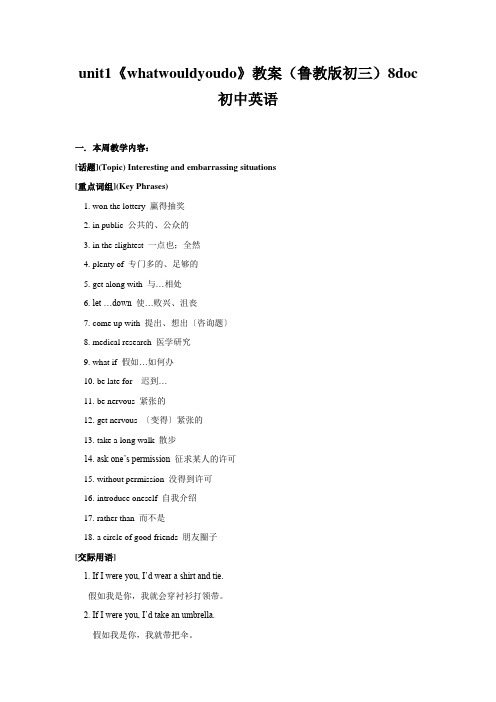
unit1《whatwouldyoudo》教案(鲁教版初三)8doc初中英语一. 本周教学内容:[话题](Topic) Interesting and embarrassing situations[重点词组](Key Phrases)1. won the lottery 赢得抽奖2. in public 公共的、公众的3. in the slightest 一点也;全然4. plenty of 专门多的、足够的5. get along with 与…相处6. let …down 使…败兴、沮丧7. come up with 提出、想出〔咨询题〕8. medical research 医学研究9. what if 假如…如何办10. be late for 迟到…11. be nervous 紧张的12. get nervous 〔变得〕紧张的13. take a long walk 散步14. ask one’s permission 征求某人的许可15. without permission 没得到许可16. introduce oneself 自我介绍17. rather than 而不是18. a circle of good friends 朋友圈子[交际用语]1. If I were you, I’d wear a shirt and tie.假如我是你,我就会穿衬衫打领带。
2. If I were you, I’d take an umbrella.假如我是你,我就带把伞。
3. What would you do if you won a million dollars?假如你赚了一百万美元,你会做什么?4. What if I don’t know anyone?假如我一个人也不认识如何办?5. You should eat lots of fruits and vegetable and drink lots of water.你应该吃大量水果、蔬菜,大量喝水。
Unit 1 What would you do【教学目标】知识与能力:(1)Learn the new words and expressions of this unit.(2)Try to improve the ability of rea ding and writing.(3)Have the ability to talk about the future.过程与方法:(1)Learn the new knowledge from to the easy ones to the difficulties. (2)Work in pairs and groups.情感态度与价值观:(1)Ask to the students to work hard and help each other.(2)Try to improve the interest of learning English.【重点难点】重点:(1)Some important words.Million ,research ,energetic ,confident ,permission ,knowledgeable ,represent ,nearby ,correct ,offer ,refuse ,treat(2) Some important expressions.Millions of ,medical research ,be confident to do ,have confidence doing ,come up with ,plenty of ,the rest of ,come out ,cover with ,by accident ,难点:What would you do if you had a million dollars ?虚拟语气的使用。
And some important sentences.【教具准备】A recorder and some teaching things.课时安排:Words 1 课时Grammar and Section A 2 课时Section B and Selfcheck 1 课时Reading 2 课时Exercises and Test 2 课时【课题】Unit One What would you do ?【教学目标】知识与能力:(1) Some important words and useful expressi ons(2)learn the new grammar(3)Use them to do exercises过程与方法:(1)采用任务型教学法,用What would you do if you had a million dollars?这个问句,引出谈论假想情况的话题。
unit1whatwouldyoudo教案(鲁教版初三)10doc初中英语I.Learning objectives 教学目标II. Teaching materials analyzing and rearranging 教材分析和重组1. 教材分析本单元以What would you do为话题,共设计了四个部分的内容:Section A该部分有4个模块:第一模块围绕What would you do if you had a lot of money?这一话题展开思维〔1a〕、听力〔1b〕、口语〔1c〕训练;第二模块围绕Embarrassing situations〔worries/problems〕进行听力〔2a-2b〕、口语训练〔2c〕;第三模块连续就上一模块中的Embarrassing situations 这一话题展开训练,训练形式为阅读配对〔3a〕和角色表演〔3b〕;第四模块仍就Embarrassing situations以小组活动形式展开讨论。
Section B该部分有4个模块:第一模块是词汇的学习〔1a〕与运用〔1b〕;第二模块围绕A personality survey连续对What would you do if…/I would…进行听力〔2a-2b〕、口语训练〔2c〕;第三模块连续围绕A personality survey 这一话题展开阅读〔3a〕和写作〔3b〕训练;第四模块仍就A personality survey这一话题以口语训练形式展开小组活动。
Self Check该部分有2个模块:第一模块以填空形式对所学词汇进行训练;第二模块就一封E-mail展开阅读和写作训练。
Reading该部分共设置了5项任务:第一项任务以咨询题讨论的方式激活学生相关背景知识;第二项任务要求学生通过快速阅读猎取信息;第三项任务利用讨论、写作等练习形式加深学生对阅读内容的明白得;第四项任务要求学生能运用所学知识解决实际咨询题;第五项任务要求学生运用所学知识开展实践活动〔做一次调查〕。
Unit 1 What would you do【教学目标】知识与能力:(1)Some important words and useful expressions(2)learn the new grammar(3)Use them to do exercises过程与方法:(1)采用任务型教学法,用What would you do if you had a million dollars?这个问句,引出谈论假想情况的话题。
(2)采用提问、启发和归纳的教法,让学生易于接受教材内容,培养学生的语言运用能力。
情感态度与价值观:(1)发展学生的听及识记能力,培养学生综合语言运用能力。
(2)通过本节课的学习,激发学生对社会的关注, 增强奉献意识,使学生形成积极的情感态度,主动思维,大胆表述,提高语言实际运用能力【重点难点】重点:Learn something about reading.Learn some useful expressions.难点:To express the reading in English.【教具准备】【教学过程】Step 1.Have a free talkWhat would you if had a million dollars?Step 2.Check the homeworkAsk a few students to give the answers to the tests.Step3.Show the teaching aimsWe will learn reading.Step4.New teachingSection 1 Before you read talk about the two questions.Group workDiscuss the fo llowing questions and take notes.1. What kinds of accidents do you know of?2. What is the biggest problem a teenager has?Section 2 While you readRead the article quickly and find the main idea of each paragraph.Read the article carefully and circle the words you don’t know.Explain the difficulties in class.Section 3. After you readDiscuss these questions with a partner.1.Why is cold running helpful to treat a small burn?2.Why would it be dangerous to meet an “internet friend”alone?3.Find the important pointsHave experience doing sth. , deal with /do withCome out ,give advice on … ,by accident /by chanceMa ke her comfortable ,cover the cut with a clean clothHurry to do sth. ,find out ,put the burned area under the cold running water ,the dangers of smoking, hide the medicine from children ,meet an internet friend alone Step5.SummaryAsk some students to talk about what they have learnt in this cl ass.【作业设计】HomeworkA. Read and write the useful expressionsB. Use them to do exercises in your workbooks【板书设计】及【当堂小测】Reading of Unit One一.Expressions1.做……有丰富的经验2.处理,对付3.出版,开花4.给予……方面的意见5.意外地6.使她舒服7.用一块干净的布盖在伤口上8.匆忙地做……(3种)9.查找,发现 10.把烧伤的地方放在凉的流水下11.把药藏在远离孩子的地方 12.吸烟的害处13.同意独自去 14.向你的医生请求意见15.一个人见网友二.Translation:1.如果他是你,他将在你家近处的书架上放一本急救手册。
Unit 1 What would you do?一. 本周教学内容:[话题](Topic) Interesting and embarrassing situations[重点词组](Key Phrases)1. won the lottery 赢得抽奖2. in public 公共的、公众的3. in the slightest 一点也;根本4. plenty of 很多的、足够的5. get along with 与…相处6. let …down 使…失望、沮丧7. come up with 提出、想出(问题)8. medical research 医学研究9. what if 如果…怎么办10. be late for 迟到…11. be nervous 紧张的12. get nervous (变得)紧张的13. take a long walk 散步14. ask one’s permission 征求某人的许可15. without permission 没得到许可16. introduce oneself 自我介绍17. rather than 而不是18. a circle of good friends 朋友圈子[交际用语]1. If I were you, I’d wear a shirt and tie.如果我是你,我就会穿衬衫打领带。
2. If I were you, I’d take an umbrella.如果我是你,我就带把伞。
3. What would you do if you won a million dollars?如果你赚了一百万美元,你会做什么?4.What if I don’t know anyone?如果我一个人也不认识怎么办网]5. You should eat lots of fruits and vegetable and drink lots of water.你应该吃大量水果、蔬菜,大量喝水。
Unit 1 What would you do?
Language Focus: more than two years, practise speaking English, the Greens, none of the them, keep doing something, fall fast asleep /awake, wake up, last long Properties: Recorder; Overhead Projector; Pictures.
Teaching Procedures:
I. Showing aims
Have the students know what they will learn in this lesson and what they will do in this class:
1. Master some useful expressions.
2. Read the passage “Jim’s Train Ride” carefully to improve their reading ability.
3. Know something about Mount Emei and some other mounts in China.
II. Revision
1. Check homework.
2. Revise the Object Clause. Play games “Polly says…” Have the students do in groups of three.
K: Nancy is not here yet.
T: She will be here soon.
Y: Nancy is not here yet. I hope that she will be here soon.
K : The weather is cloudy.
T : It will clear up soon.
Y: The weather is cloudy. I hope that it will clear up soon.
K: There is a lot of food.
T: You can eat more.
Y: There is a lot of food. I hope that you can eat more.
K: The park is crowded.
T: There are enough tables and benches.
Y: The park is crowded. I hope that there are enough tables and benches.
III. Pre-read
Part 1. In small groups have the students answer the questions. Then discuss the questions in class.
Put up a map of China on the blackboard and get the students to show Mount Emei and other mounts such as Mount Hua etc, and talk about some mounts if they know them.
IV. Presentation
Have the students discuss in groups. Ask: “What will they do if they will go travelling?” A few minutes for them to discuss, then ask some of them to give their reports to share with the class.
V. Reading
Part 2. Speech Cassette. Let the students read through the passage to find the answer to the question: How did Jim feel on his trip to Mount Emei? Help the
students use these words: happy, exciting, … See if the students can guess the meaning of the new words.
Play the tape. Ask the students to listen carefully. The teacher may stop the tape while the students are listening, and ask the students to go on reading. It can test the students' ability to follow the passage as it is read on the tape.
Using Exercise I in the workbook of Lesson 14, check the students' reading. The students ask and answer in pairs.
VI. Acting
Divide the students into small groups. Change this passage into a play, ask them to act out this play. One of them plays the part of a narrator, the others play Mr Green, Mrs Green, Jim, the conductor, and fruit shop assistant.
VII. Workbook
Do Exercise 3 in class. Have the students read the sentences and translate them into Chinese, check with the whole class.
For Exercise 2, it can be worked as homework.
VIII. Summary
Exercises in class:Rewrite the following sentences
1. He will have a train ride to Beijing. ( He says…)
2. Class Three will have a football match with Class Two. ( The teacher says…)
3. The station is very lively. ( He said… )
4. A young man is practicing /practicing s peaking English. ( Jim said… )
5. The train is quite comfortable. (Jim thought…)
6. There aren’t too many people in their sleeping car. ( Jim told me…)
IX. Homework
Read the passage after class.Finish off the exercises in the workbook.
板书设计
Lesson 1 Jim’s Train Ride
————————“What will they do if they will go travelling?”————————How did Jim feel on his trip to Mount Emei? ——-——————He felt very happy and exciting,
Rewrite the following sentences
1. He will have a train ride to Beijing. ( He says…)
2. Class Three will have a football match with Class Two. ( The teacher says…)
3. The station is very lively. ( He said… )
4. A young man is practicing /practicing speaking English. ( Jim said… )
5. The train is quite comfortable. (Jim thoug ht…)
6. There aren’t too many people in their sleeping car. ( Jim told me…)。